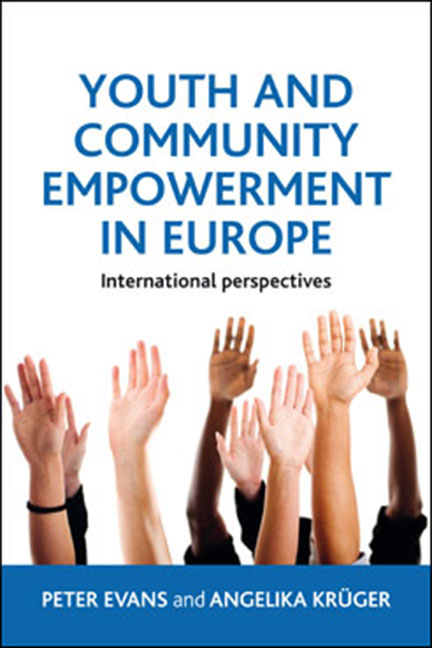Book contents
- Frontmatter
- Dedication
- Contents
- List of figures and tables
- List of abbreviations
- Acknowledgements
- Preface
- Background to the Youth Empowerment Partnership Programme
- one Introduction: the theoretical context of the YEPP approach
- two YEPP I: implementation
- three YEPP I: key changes in YEPP Local Programme Sites
- four YEPP I: meeting the goals
- five YEPP II: learning from YEPP I
- six YEPP II: portraits and overall programme outcomes
- seven YEPP I and II: conclusions and policy implications
- Epilogue: The future of YEPP
- References
- Index
two - YEPP I: implementation
Published online by Cambridge University Press: 07 September 2022
- Frontmatter
- Dedication
- Contents
- List of figures and tables
- List of abbreviations
- Acknowledgements
- Preface
- Background to the Youth Empowerment Partnership Programme
- one Introduction: the theoretical context of the YEPP approach
- two YEPP I: implementation
- three YEPP I: key changes in YEPP Local Programme Sites
- four YEPP I: meeting the goals
- five YEPP II: learning from YEPP I
- six YEPP II: portraits and overall programme outcomes
- seven YEPP I and II: conclusions and policy implications
- Epilogue: The future of YEPP
- References
- Index
Summary
The previous chapter outlined the broader context in which YEPP has been created and explained its key concepts of empowerment and partnerships. This chapter provides an account of the implementation of YEPP I, its concept of change and the method used to evaluate changes on the ground.
The YEPP Concept of Change in practice
YEPP was implemented in six European countries, in seven disadvantaged areas. These sites are known as ‘Local Programme Sites’. The countries and sites involved are:
• Belgium: Antwerp-North
• Bosnia and Herzegovina: Tuzla (Simin Han)
• Finland: Kristinestad
• Germany: Mannheim (Neckarstadt-West)
• Ireland: Dublin (North-East Inner City)
• Italy: Turin (Mirafiori South)
• Italy: Turin (Parella).
Local Programme Sites are both rural and urban areas where social and economic problems are at such a level that they are seriously detrimental to the general prospects of children and youth. In addition, Local Programme Sites already contain a large number of initiatives intended to engage with young people and the communities in which they live. However, despite these actions, which tend to be fragmented, there remains a need for further investment in order to provide more comprehensive joint strategies through the development of partnerships.
YEPP is both a national and an international project and the principles given in the previous chapter work at both of these levels. Thus, each national YEPP site functions independently within its own national and local context and at the transnational level, through which the actors involved in each of the Local Programme Sites meet regularly to support each other, share information, build capacity and plan new transnational projects and events.
YEPP was created by a group of foundations in the context of the EFC to develop a coherent response to youth and communities that were experiencing substantial difficulties and where foundations were already working at a high level of intensity. These foundations made up the main part of the steering committee of YEPP and provided the necessary funding. This committee worked under the auspices of NEF.
A particular feature of YEPP was the involvement of Peter Evans of CERI at the OECD. As a member of the CERI secretariat, he became involved in YEPP through earlier work on integrating services for children and youth at risk that had been supported by one of the key foundations involved in establishing YEPP – the Charles Stewart Mott Foundation of the US.
- Type
- Chapter
- Information
- Youth and Community Empowerment in EuropeInternational Perspectives, pp. 13 - 18Publisher: Bristol University PressPrint publication year: 2012



